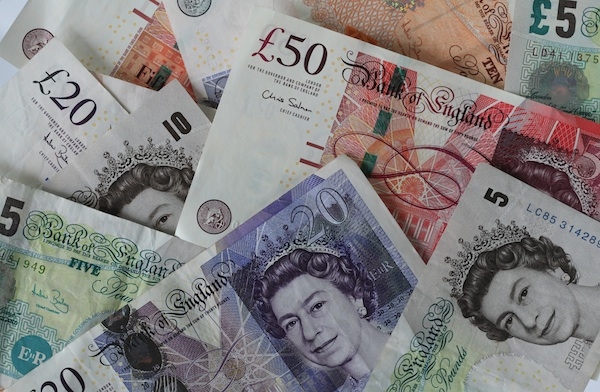More gloom and doom on the markets this morning after the pound hit a new low in Asian trading as concerns about the UK’s vote to leave the European Union continued to undermine investor confidence.
It touched 1.2798 against the dollar on Wednesday, a 31-year low, before recovering slightly to $1.2929. According to the BBC, the pound has now fallen about 14 per cent against the dollar since hitting $1.50 ahead of the referendum result. However, at the time of writing, the FTSE 100 had changed course and was up 0.3 per cent at 6,569 points. It’s a different story on the story on the FTSE 250 though – which contains more UK-focused companies than the FTSE 100. It has fallen almost 0.4 per cent.Yesterday was all about the Bank of England after it warned of ‘challenging’ risks to financial stability following the vote for Brexit. The Bank took steps to release up to £150 billion worth of lending to households and businesses by relaxing regulatory requirements on the banking sector.
As it published its twice-yearly assessment of financial stability, the Bank said the risks it had feared ahead of the EU referendum had started to crystallise.
Housing
The Bank of England governor Mark Carney made it clear yesterday that the commercial property market is one of the risks to the UK economy. This morning, Lucian Cook, director of residential research at Savills, told the Today programme that the outlook for the UK residential market is weaker. ‘In the longer term there’s just uncertainty about what the wider economic environment will be and what that means for the housing market. I think critically importantly is what happens to interest rates, which is often the main determinant of house prices and there currently we’re talking about cuts in bank base rate. ‘That could be offset by increases in lenders’ margins but certainly not the spiralling interest rates which would cause, for example, significant levels of repossession which would push house prices into negative territory. It looks like it’s going to be much more benign than that.’ Property fundsM&G Investments is the latest firm to suspend trading in a property fund following the Brexit vote. M&G closed the doors on its £4.4 billion fund – the UK’s biggest commercial property fund – after Aviva and Standard Life halted trading in similar schemes.
Food prices
Food prices saw their biggest fall for over a year last month as prices continued to drop. Grocery prices fell 0.8 per cent in June, extending May’s 0.3 per cent fall and marking the deepest deflation in food for over a year, according to the British Retail Consortium-Nielsen Shop Price Index.
Shop prices overall, including non-food items, fell 2 per cent year-on-year, marking the 38th consecutive month of decline. The BRC said it was an ‘extraordinary run of deflation’. However, the retail trade body said it eventually expected prices to rise again. Credit card charges Shoppers have been ripped off by as much as £400 each due to unfair chip and pin charges in shops, lawyers preparing a historic class action case against MasterCard have claimed. Millions of consumers stand to receive hundreds of pounds in compensation as the result of a £19 billion pound claim being launched against MasterCard over ‘illegal’ card charges. The Telegraph reports that consumer rights campaigners say shoppers were kept in the dark about the charges they were being forced to pay when using their cards. Energy bills The Telegraph also reports that two of Britain’s biggest energy suppliers have called for an overhaul of the ‘regressive’ and unfair way policy and network costs are charged to consumer energy bills. Iain Conn, chief executive of British Gas owner Centrica, and Vincent de Rivaz, chief executive of EDF Energy, both argued that levies added on to bills placed a disproportionate burden on the poorest customers. About 13 per cent of a typical household electricity bill is made up of environmental and social levies to fund green subsidies and insulation schemes, while a further 25 per cent of an electricity bill consists of levies to fund network infrastructure. Fuel costs The average prices of petrol diesel have increased for the fourth month running, according to RAC Fuel Watch data for June, but wholesale fuel prices have only risen very slightly as a result of the pound weakening after the UK voted to leave the EU. Unleaded went up 1.5p a litre (110.69p to 112.17p) and diesel by 1.66p (110.73p to 112.39p) in a month which saw oil rise from $48 to an early high of $50.73 and then fall to a mid-month low of $45.95 before finishing June on $48 again, coupled, of course, with the pound hitting a 31-year low against the dollar. Tax avoidance The EU executive has announced a further clampdown on offshore tax avoidance and shell companies in response to the Panama Papers. The European Commission wants tax authorities to be able to identify the real owners of offshore funds in an attempt to stop individuals and companies avoiding tax by hiding money and assets in opaque companies and offshore trusts. According to the The Guardian, the EU executive has also promised a robust new law to clamp down on lawyers and tax advisers helping clients stash money in offshore islands, although details remain sketchy.





Comments